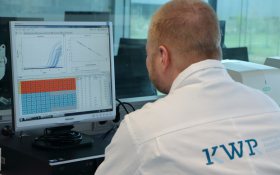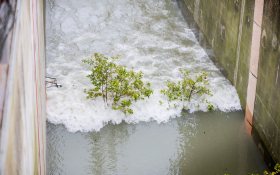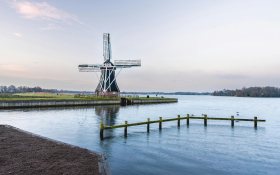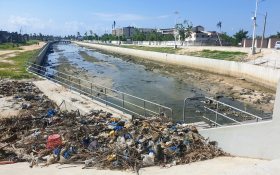Stockholm World Water Week: 2017: Global water sector has to quadruple its expenditure
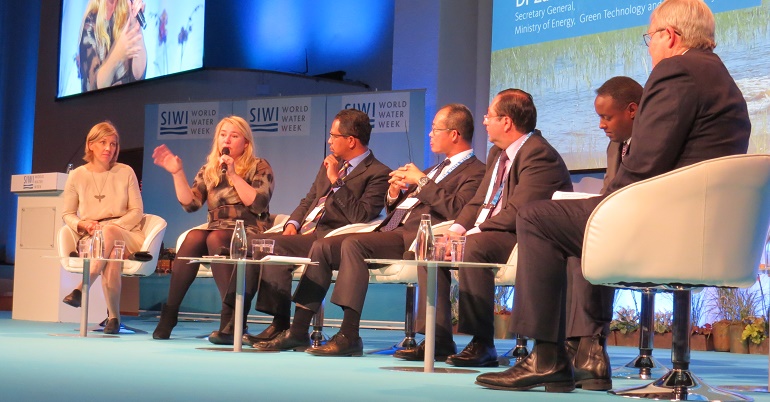 Countries need to quadruple their spending to 150 billion US dollar a year to deliver universal safe water and sanitation, according to the World Bank at the Stockholm World Water Week that started on 28 August.
Countries need to quadruple their spending to 150 billion US dollar a year to deliver universal safe water and sanitation, according to the World Bank at the Stockholm World Water Week that started on 28 August.
The World Bank called for better coordinated and targeted investments to ensure that services reach the most vulnerable. Governments need to engage with the private sector more closely to meet the high costs.
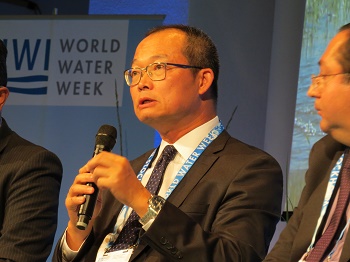 Guangzhe Chen of the World Bank called for more bankable water projects., with tariffs based on cost recovery.
Guangzhe Chen of the World Bank called for more bankable water projects., with tariffs based on cost recovery.
Waste water
This year’s edition of the World Water Week focuses on the issue of waste water. Worldwide, 80 percent of all waste water is discharged untreated, polluting ponds, rivers, seas and even oceans.
The pollution impacts the ecology in these water bodies, especially the vulnerable wetlands and coral reefs. As a result, less fresh water is available. In a world with a growing population, water demand will outgrow its supply.
During the week-long meeting, 3,100 attendees from 130 countries focus on finding ways to reduce the pollution by better use and reuse of water. These solutions also address the issue of increasing droughts.
It was mentioned several times by speakers on the opening day: droughts are caused by nature, scarcity by man.
Service providers
The theme dominating the discussions on the first day was undoubtedly the financing. The water sector must quadruple its expenditure to be able to meet the Sustainable Development Goal on water (SDG #6) by 2030, including universal access to clean water and sanitation.
“The tariffs for water services are too low”, said Guangzhe Chen, senior director of the Water Global Practice of the World Bank. He participated in the panel discussion during the official opening ceremony. He urged utilities to perform better so they can attract investors for expansion and improvement of their water supplies.
“Utilities are the best party to push the availability of clean water and sanitation”, Chen said. “Some recover no costs, others recover all costs. It is our job to support the utilities that recover no costs with technical skills to set up bankable projects.”
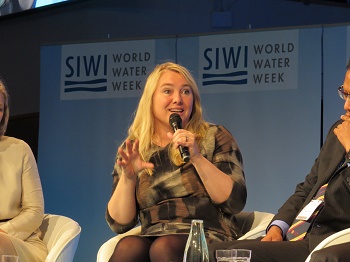 Dutch minister Schultz van Haegen advocated to address water issues in an interrelated way.
Dutch minister Schultz van Haegen advocated to address water issues in an interrelated way.
Complex global water agenda
Panel leader Kevin Rudd, chair of the partnership Sanitation and Water for All, provoked his panelists with the question whether the global water agenda is so complex that it is becoming too big.
Dutch minister of Infrastructure and Environment, Melanie Schultz van Haegen, responded by mentioning the need to focus on specific issues. “As a low-lying country, we have to focus on flood protection, so we created a group, the Delta Coalition, to share our knowledge with other countries.”
As an example, Schultz mentioned the joint efforts with Indonesia to solve the complex water issues in Jakarta. “The city subsides because of illegal ground water extractions. So, the people of Jakarta have to be protected against floods by a sea wall. But to be able to construct such a wall, we must clean the rivers first. It shows that we must treat water issues as interrelated”, the Dutch minister said.
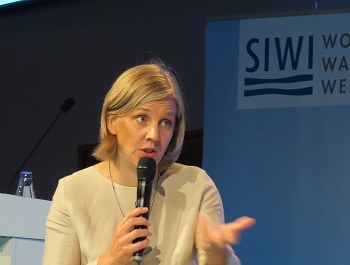 Swedish minister Skog suggests to start with local pilots. If they prove to be successful, the word should be spread better.
Swedish minister Skog suggests to start with local pilots. If they prove to be successful, the word should be spread better.
Scale up local solutions
As a panelist, Swedish environmental minister Karolina Skog urged the global water community to stay focused on solutions. “We need to make water problems manageable and not push the big global problems to citizens.”
Skog advised to follow the Swedish example: start pilots with new solutions locally, and scale them up if they are successful. “Essential is that we spread the locally gained knowledge across the world in order to be able to scale up the pilots.”
Dutch delegation
To get insight of the Dutch contribution to the Stockhol World Water Week, view the special SWWW page on this website with a day-by-day programme overview.
Stay tuned as news items on this website will keep you posted on these Dutch contributions.
Read also on this site
• Antioxirice crop spray selected as Dutch entry for Stockholm Junior Water Prize 2017, 14 June 2017
• Stockholm World Water Week 2016: linking the global agenda on water and climate, a look back, 6 September 2016
• Stockholm World Water Week 2015: A look back on the stepping stone to New York and Paris, 4 September 2015
More information
Stockholm World Water Week
www.worldwaterweek.org
